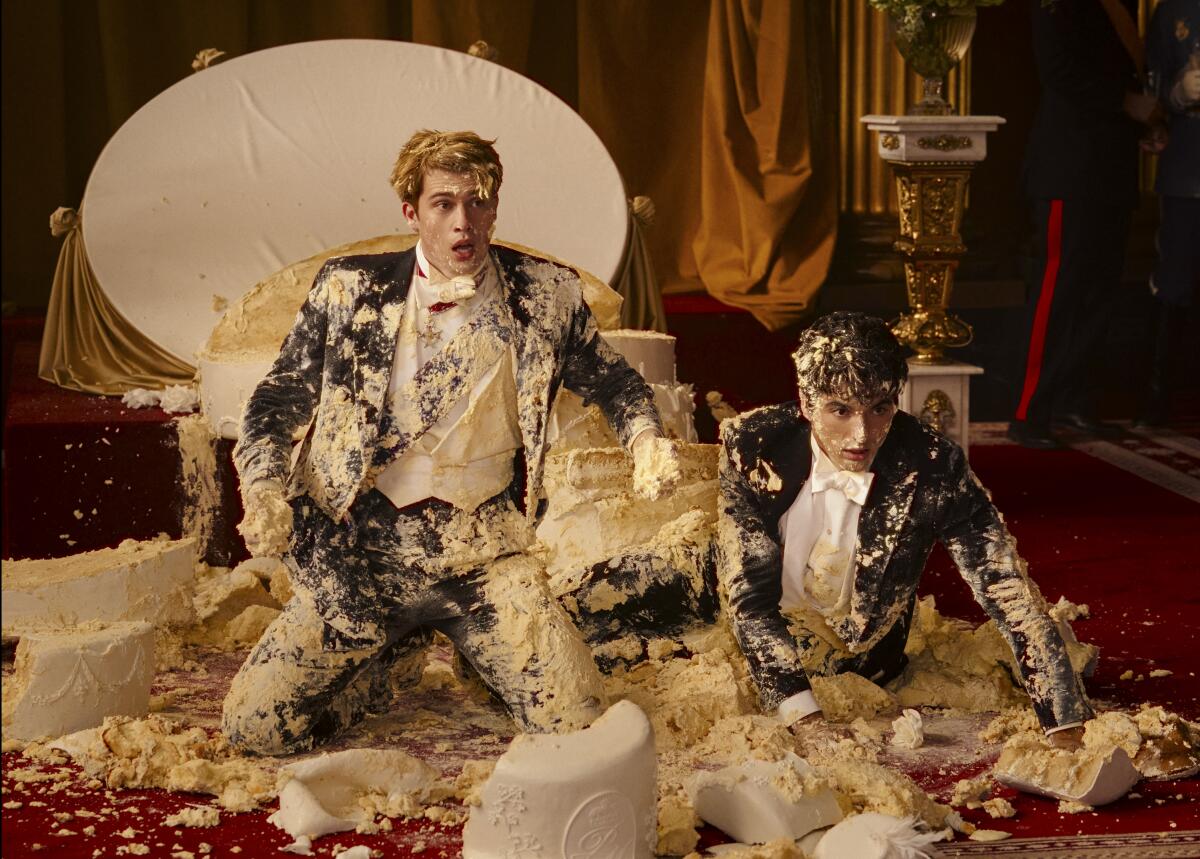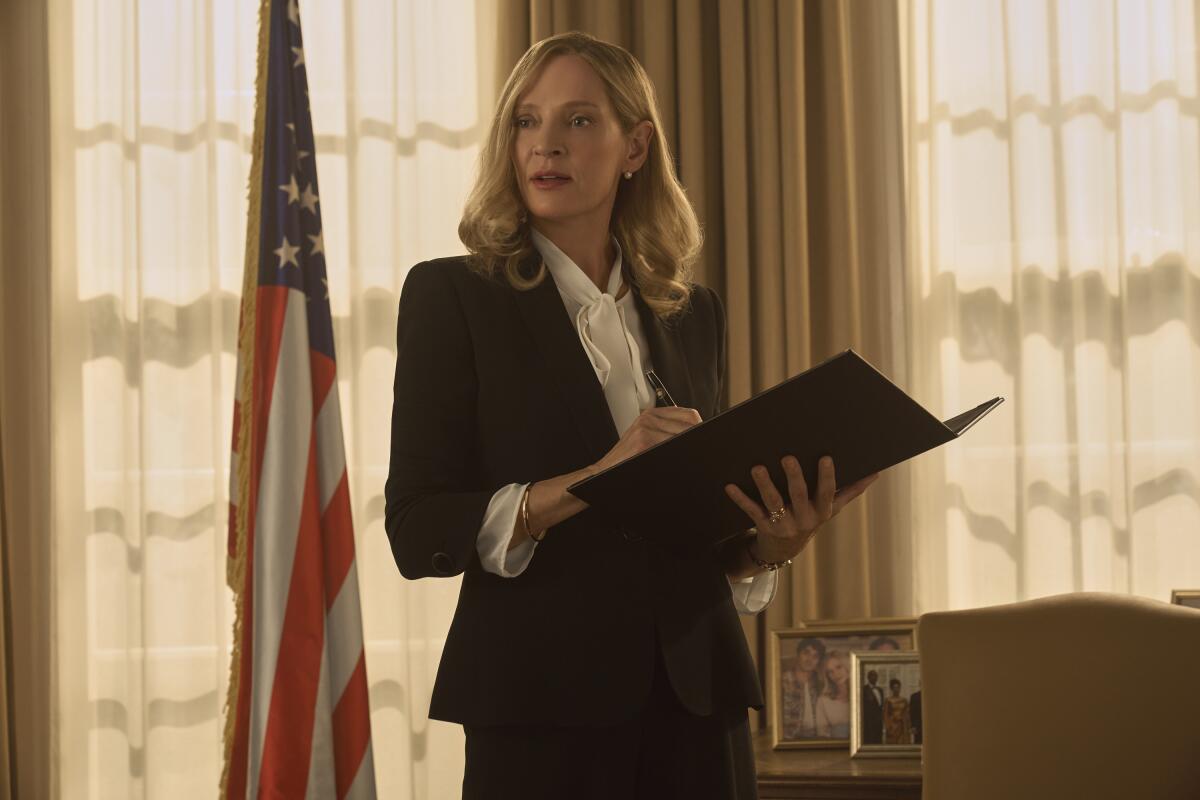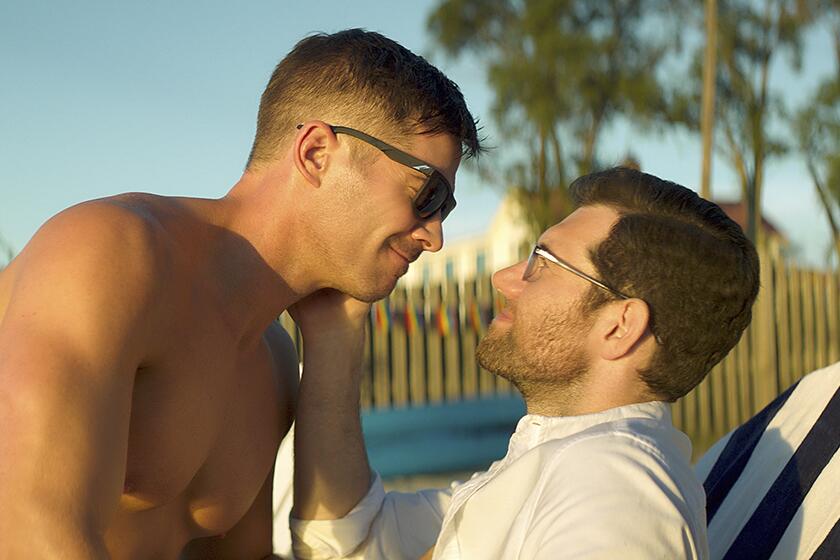‘Red, White & Royal Blue’ is the gay rom-com we’ve been waiting for

- Share via
You should know before reading further that I fell for “Red, White & Royal Blue” when the American president’s son clasped the Prince of Wales’ bottom.
It’s a playful touch — a love tap, really — but the moment is made cheekily scintillating by its setting, a state dinner for the leaders of the two world powers, negotiating a new trade agreement. In an antechamber nearby, Alex Claremont-Diaz (Taylor Zakhar Perez), whose mother, a pioneering Democrat, is in the midst of a tough reelection campaign, and Prince Henry Hanover-Stuart-Fox (Nicholas Galitzine), whose brother is heir to the British throne, have just begun their own, ahem, special relationship.
Alex’s lighthearted handful of royal tush couldn’t come soon enough — if not for the film, then for pop culture at large. If I’d had to see another gay romantic comedy built around two straight men, I was sure I was going to scream.
I mean “straight men” in the comic sense, of course. Against the self-congratulation and self-flagellation that have sunk several of its predecessors, “Red, White & Royal Blue,” adapted by director Matthew López (“The Inheritance”) and Ted Malawer (“Halston”) from Casey McQuiston’s equally frothy novel, seems liberated from the pressure to say something profound about queer history or representation. Blithely or cannily, depending on your point of view, the film even skates over its own political backdrop: Xenophobia, gender-neutral bathrooms and resentment of the monarchy all receive passing mention, but these just blend into the palace wallpaper. Any triumph for LGBTQ+ people “Red, White & Royal Blue” might achieve is mostly unacknowledged and apparently unplanned. If you’ve already spent a lifetime clinging to winks and nods, counting milestones and historic firsts, it almost comes as a relief.

“Merely” a giddy, goofy confection in which two beautiful, privileged young men fall in lust, then in love, the film prefers to spend its time chasing rom-com convention. Sidekicks have never been practical in a genre where clocking in above two hours is a violation of most international treaties, so Henry’s poor sister Beatrice (Ellie Bamber) gets predictably short shrift; as Alex’s BFF Nora, the vice-president’s daughter, Rachel Hilson at least has a chance to throw some Judy Greer-style shade. Yet one would feel cheated without them — or without Uma Thurman’s demanding, hard-drawling rom-Mom, President Ellen Claremont. Or, in the grand tradition of the unethically horny journalist, political reporter Miguel Ramos (Juan Castano), who eyes Alex so hungrily I wanted to make him a sandwich.
The real key to “Red, White & Royal Blue,” though, is that this fan service doesn’t render the film chaste. Randy if not raunchy, it unashamedly cuts away to the Washington Monument at one electric moment, zooms in on the spare’s bouncing derriere at another. Hell, if you’re keeping score at home, the opening sequence, which leaves our protagonists covered in white frosting, could be taken as foreshadowing.
Billy Eichner’s tweets are misplaced: The freedom ‘Bros’ extols is the freedom to fight over, criticize and, yes, ignore the art that represents us.
Perhaps most cleverly, the film reserves its comic firepower not for references to Grindr, Truvada, bottoming and “the B in LGBTQ” (the last three of these from the mouth of mama bear Claremont, giving “the talk” to her bisexual cub), but for less obvious material. The film’s best throwaway lines, about auctioning shoes off to fans, leading with one’s height, the difference between rugby and football, all have the feeling of an in-joke for those of us who are, as the prince describes himself, “gay as a maypole.” If you know, you know.
The challenge for queer reinterpretations in any genre, unfair as it may be, is to walk this tightrope successfully. Be too specific and it suddenly becomes “niche.” Be too concerned with straight viewers and it feels like pandering. Faced with this impossible bind, “Red, White & Royal Blue” occasionally wrong-foots itself, not least with the “consequential” strings that score what would otherwise be a steamy sex scene.
In being so unabashed about its political fantasy, though, the film clears a path for its romantic one. If you are prepared to the accept that the pretty-boy son of the first female president could lead the Democrats to victory in Texas, or that the coming-out of a British royal could spark spontaneous demonstrations across the U.K., the notion of them kindling a secret love affair across a sea of partygoers booty-dropping to “Get Low” cannot possibly seem like a stretch. It’s just another exquisitely entertaining fillip of invention.

This utopian instinct draws from the same far-fetched spring as “Notting Hill,” in which a movie star is just a girl standing in front of a boy asking him to love her, and “You’ve Got Mail,” in which archrivals in business are soul mates online: “You’re being idealistic when I need you to be realistic,” President Claremont chides her lovestruck son, as if to remind us of the genre’s bedrock principles. For it may be true that the rom-com’s evolution, in the aggregate, reflects real issues, and revolutionary changes, in class structure, sexual mores, gender norms, even constitutional law. But film by film it asks us to daydream of developments smaller in scale, albeit no more fathomable: meeting cute and trading barbs, falling head over heels and falling apart. Neither “Bros,” stridently attuned to queer people’s erasure from the romantic comedy, nor “Fire Island,” mischievously mapping it onto queer spaces, so thoroughly captures the element of make-believe at the heart of the genre, queer or otherwise.
At the risk of imputing the film with the very seriousness of purpose it tends to avoid, “Red, White & Royal Blue,” in acing that test, might even be understood as transgressive in its own right. Like some straight beachhead in the war against heteronormativity, the rom-com can be captured by force (“Bros”), stolen for our own purposes (“Fire Island”), or, as in this case, subject to a sneak attack under cover of night. A Trojan horse — well, a Magnum one, if its thirstiest line is to be believed — at the doorstep of the White House, Buckingham Palace and studio C-suites, López’s film smuggles queer ideas and images into spaces traditionally populated by straight people and shaped by straight tastes. Which is, to be clear, no more the “right” way of updating the genre for the 21st century than any other.
It’s just nice, for a change, to come in through the front door.
More to Read
Only good movies
Get the Indie Focus newsletter, Mark Olsen's weekly guide to the world of cinema.
You may occasionally receive promotional content from the Los Angeles Times.












